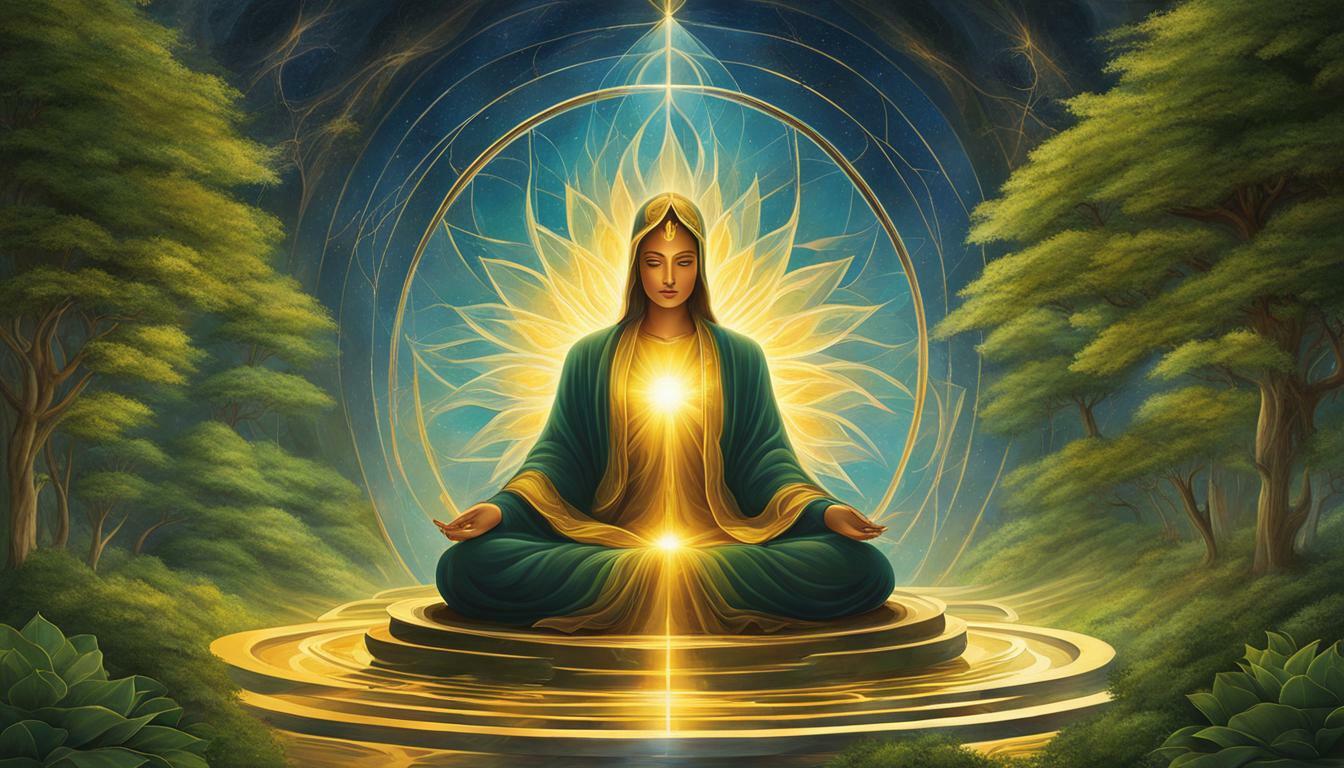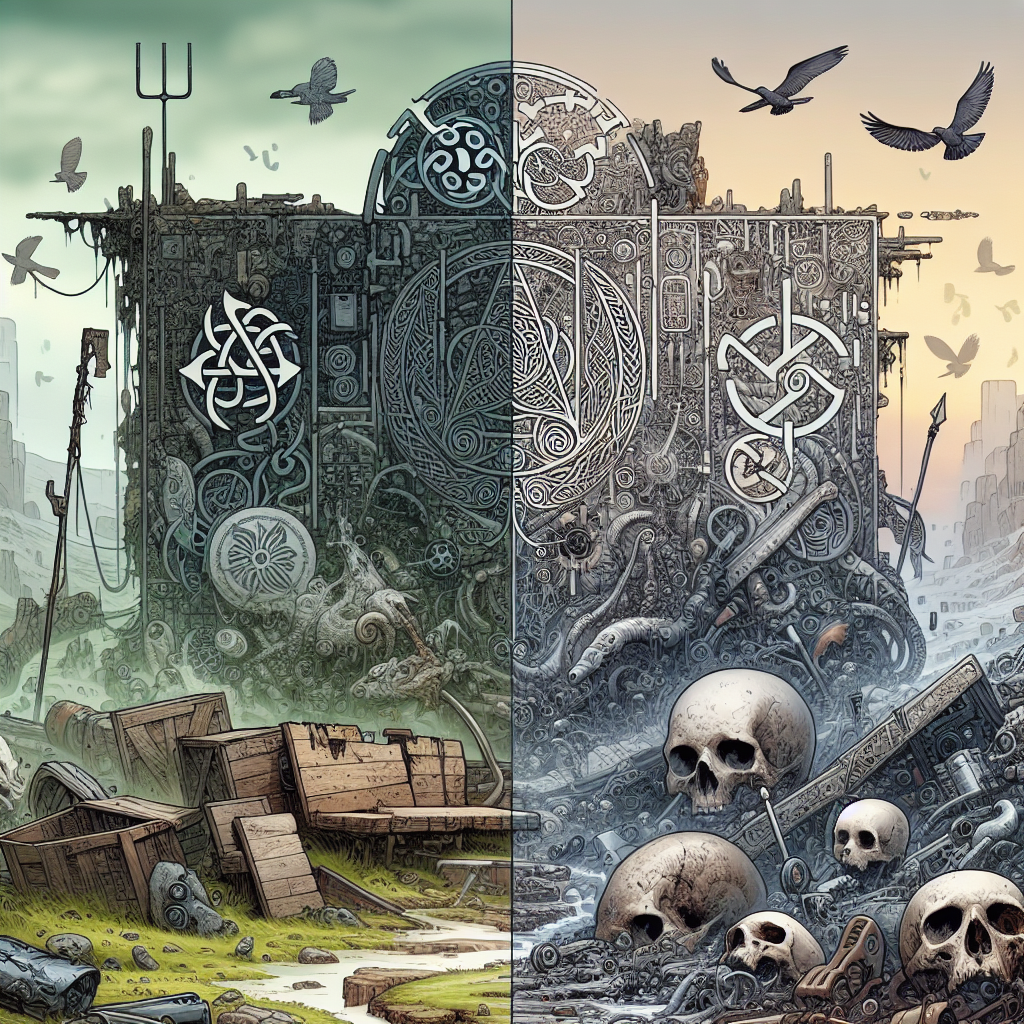The concept of Theosis and Enlightenment may seem similar at first, but they have distinct differences in their religious contexts and practices. Theosis, also known as deification, is a transformative process taught in Eastern Christian theology. It involves the pursuit of union with God and the participation in the divine nature through the purification of mind and body and the illumination with the vision of God. The ultimate goal of theosis is to become like God and achieve a state of oneness with Him, requiring the synergy between human activity and God’s uncreated energies.
On the other hand, Enlightenment is a concept commonly associated with Eastern religions such as Buddhism and Hinduism. It refers to the attainment of spiritual or intellectual insight and understanding, often achieved through meditation and self-realization. Enlightenment involves the awakening of the self and the realization of one’s true nature.
While both Theosis and Enlightenment involve the pursuit of spiritual growth and the attainment of a higher state of being, they differ in their religious contexts, goals, and practices.
Key Takeaways:
- Theosis is a transformative process in Eastern Christian theology, aiming for union with God, while Enlightenment is associated with Eastern religions like Buddhism and Hinduism, focusing on spiritual insight and self-realization.
- Theosis involves the purification of mind and body, illumination with the vision of God, and achieving a state of oneness with God.
- Enlightenment entails the awakening of the self and the realization of one’s true nature through meditation and spiritual understanding.
- Theosis emphasizes synergy between human activity and God’s uncreated energies, while Enlightenment emphasizes self-realization and the realization of one’s inner essence.
- The religious contexts, goals, and practices of Theosis and Enlightenment set them apart, despite their shared pursuit of spiritual growth.
Understanding Theosis – Pursuit of Union with God
Theosis, also known as deification, is a transformative process taught in Eastern Christian theology where humans strive for union with God and participate in His divine nature. It is a journey of spiritual growth and the pursuit of oneness with the Creator. Theosis involves the purification of both the mind and body, as well as the illumination with the vision of God’s glory.
Central to the concept of Theosis is the goal of becoming like God, not in His essence or divine nature, but by partaking in His energies and attributes. Through a process of synergy between human effort and divine grace, individuals seek to cultivate virtues, overcome passions, and align their will with God’s will. It is through this process that they gradually become more Christ-like and experience a deep communion with the divine.
A key aspect of Theosis is the recognition that humans are created in the image and likeness of God, and thus have the potential to participate in divine life. This pursuit of union with God involves a transformative journey that extends beyond mere intellectual knowledge or religious observance. It is a personal and experiential process that encompasses the whole being – body, mind, and soul.
| Theosis | Enlightenment |
|---|---|
| Theosis is a concept in Eastern Christian theology. | Enlightenment is commonly associated with Eastern religions like Buddhism and Hinduism. |
| The goal of Theosis is to become like God and achieve a state of oneness with Him. | The goal of Enlightenment is the realization of one’s true nature and the attainment of spiritual insight. |
| Theosis involves the cultivation of virtues, purification, and illumination. | Enlightenment often involves meditation, self-realization, and the awakening of the self. |
“Theosis is not a remote and inaccessible goal, but a path that can be walked here and now, in the midst of our daily lives.” – Orthodox theologian Kallistos Ware
Differences Between Theosis and Enlightenment
While Theosis and Enlightenment share some similarities in terms of spiritual growth and the pursuit of higher states of being, they differ in their religious context, goals, and practices. Theosis is deeply rooted in Eastern Christian theology and focuses on the transformative process of becoming like God and achieving union with Him. Enlightenment, on the other hand, is often associated with Eastern religions like Buddhism and Hinduism, emphasizing the realization of one’s true nature and the attainment of spiritual insight.
Another key distinction lies in the means by which Theosis and Enlightenment are pursued. Theosis involves the cultivation of virtues, purification of the mind and body, and the illumination through the vision of God. It requires synergy between human effort and divine grace. Enlightenment, on the other hand, often involves practices such as meditation, self-realization, and the awakening of the self to attain spiritual insight and understanding.
Despite their differences, both Theosis and Enlightenment represent profound spiritual paths that aim to bring individuals closer to divine realities and the realization of their true selves. Each offers unique perspectives on the journey of self-transformation and the pursuit of higher spiritual states.
Theosis – Purification and Illumination
Theosis involves the purification of mind and body, as well as the illumination with the vision of God, leading to a transformative spiritual journey. In this process, individuals strive to purify their thoughts, emotions, and actions, aligning them with the divine will. Through self-reflection, prayer, and the study of sacred texts, practitioners seek to remove the obstacles that hinder their union with God.
Like a sculptor chiseling away at a block of marble to reveal the hidden masterpiece within, the process of purification in Theosis involves the removal of negative thoughts, habits, and attachments that separate individuals from God. This inner cleansing allows practitioners to achieve a state of inner stillness, clarity, and peace, enabling them to commune with the divine.
The illumination phase of Theosis is characterized by the experience of the vision of God. Through contemplative practices, individuals open themselves to the presence of the divine and seek a direct encounter with God. This illumination brings about a profound understanding of the nature of God and oneself, leading to a transcendent union.
As St. Athanasius, an early Christian theologian, wrote, “God became man so that man might become God.” This transformative journey of Theosis allows individuals to participate in the divine nature, becoming more like God and ultimately achieving a state of oneness with Him.
| Theosis | Enlightenment |
|---|---|
| Involves purification and illumination with the vision of God | Achievement of spiritual or intellectual insight and understanding |
| Transformation through synergy between human activity and God’s energies | Awakening of the self and realization of one’s true nature |
| Central to Eastern Christian theology | Often associated with Eastern religions like Buddhism and Hinduism |
Understanding Enlightenment – Awakening of the Self
Enlightenment, often associated with Eastern religions like Buddhism and Hinduism, refers to the attainment of spiritual or intellectual insight and understanding, leading to self-realization. It is a transformative journey that involves the awakening of the self and the realization of one’s true nature. Through practices like meditation and self-reflection, individuals seek to transcend their ego and connect with a higher consciousness.
Enlightenment is characterized by a deep understanding of the interconnectedness of all beings and the recognition of the impermanent nature of reality. It is not merely an intellectual pursuit, but a profound experience of unity and liberation from suffering. The process of attaining enlightenment requires discipline, self-disclosure, and a willingness to let go of attachments and desires.
Central to the concept of enlightenment is the idea that each individual has the potential to awaken to their true nature. This realization brings about a sense of peace, compassion, and wisdom. It is a state of being that transcends the limitations of the ego and allows individuals to live in harmony with themselves and the world around them.
| Theosis | Enlightenment |
|---|---|
| Involves pursuit of union with God | Leads to self-realization |
| Purification of mind and body | Awakening of the self |
| Process of illumination with the vision of God | Attainment of spiritual insight and understanding |
| Goal of becoming like God | Realization of one’s true nature |
While theosis and enlightenment differ in their religious contexts and practices, they both share the common goal of spiritual growth and the pursuit of a higher state of being. Whether through theosis in Eastern Christian theology or enlightenment in Eastern religions, individuals seek to transcend their limited selves and achieve a deeper connection with the divine or their true essence. These paths offer guidance and transformative practices to those on a spiritual journey, providing avenues for personal growth, self-discovery, and a greater understanding of the nature of reality.
Enlightenment – Pursuit of True Nature
Enlightenment involves the journey towards discovering one’s true nature and achieving a higher state of being through practices like meditation and self-realization. It is a concept deeply rooted in various Eastern religions, including Buddhism and Hinduism, where individuals seek to awaken their inner self and gain spiritual insight.
In the pursuit of enlightenment, practitioners often engage in meditative practices that help quiet the mind and cultivate mindfulness. Through focused attention and self-reflection, individuals aim to transcend the limitations of the ego and connect with their higher consciousness. This process of self-realization is not limited to a specific dogma or religion; rather, it encompasses a universal search for inner truth and liberation from suffering.
The path to enlightenment involves shedding attachments and illusions, recognizing the impermanence of all things, and cultivating compassion and love for all beings. It is a transformative journey that requires deep introspection and the willingness to confront one’s own fears and desires. Through the development of wisdom and compassion, individuals can transcend the cycle of suffering and achieve a state of profound peace and harmony.
Table: Comparing Theosis and Enlightenment
| Theosis | Enlightenment |
|---|---|
| A concept in Eastern Christian theology | Associated with Eastern religions like Buddhism and Hinduism |
| Striving for union with God | Seeking spiritual or intellectual insight |
| Purification of mind and body | Transcending attachments and illusions |
| Participation in the divine nature | Awakening of the self |
| Requires synergy between human activity and God’s energies | Achieved through practices like meditation and self-realization |
Both theosis and enlightenment share the goal of spiritual growth and the pursuit of a higher state of being. While they may differ in religious context and practices, they both invite individuals to embark on a transformative journey towards self-discovery, awakening, and the realization of their true nature.
Differences Between Theosis and Enlightenment
While both Theosis and Enlightenment involve the pursuit of spiritual growth and higher states of being, they differ in their religious backgrounds, goals, and the methods used to achieve them.
Theosis: Theosis, also known as deification, is a concept deeply ingrained in Eastern Christian theology. It emphasizes the transformation of human nature to achieve union with God and participate in the divine nature. The goal of Theosis is to become like God and attain oneness with Him. The process involves purifying the mind and body, cultivating virtues, and seeking illumination through the vision of God’s uncreated energies. Theosis requires a synergy between human effort and the divine grace.
Enlightenment: Enlightenment, on the other hand, is commonly associated with Eastern religions such as Buddhism and Hinduism. It focuses on the awakening of the self and the realization of one’s true nature. The goal of Enlightenment is to attain spiritual or intellectual insight and understanding. This is often achieved through various practices such as meditation, self-reflection, and the pursuit of self-realization. While Enlightenment may not involve the concept of union with a higher power as in Theosis, it offers a path to transcendence and the realization of the ultimate truth.
Comparing Theosis and Enlightenment:
| Theosis | Enlightenment |
|---|---|
| Rooted in Eastern Christian theology | Associated with Eastern religions |
| Achieving union with God and participation in the divine nature | Attaining spiritual or intellectual insight and understanding |
| Purification of mind and body, illumination through God’s vision | Awakening of the self, realization of true nature |
| Synergy between human effort and divine grace | Meditation, self-reflection, self-realization |
While Theosis and Enlightenment differ in their religious contexts, goals, and practices, they both offer paths to spiritual growth and the attainment of a higher state of being. Whether one seeks union with God or the realization of self, these concepts provide individuals with frameworks to pursue deeper understanding and connection with the divine or their inner selves.
The Role of Synergy in Theosis and Self-Realization in Enlightenment
In Theosis, the process requires synergy between human activity and God’s uncreated energies, while Enlightenment focuses on self-realization through individual effort and awakening. The concept of synergy in Theosis refers to the cooperation between human beings and God in the pursuit of spiritual transformation. It is believed that humans, through their own free will and participation in divine grace, can work alongside God to become more like Him and achieve unity with the divine.
This synergy involves a combination of both active and receptive elements. On one hand, individuals must actively engage in the process of purification and illumination through prayer, repentance, ascetic practices, and the cultivation of virtues. These efforts, combined with the grace of God, bring about the transformation of the person’s inner being and the alignment of their will with the divine will.
On the other hand, individuals must also be receptive to the uncreated energies of God. This involves surrendering oneself to God’s presence, opening the heart and mind to His transformative love, and allowing His grace to work within. This receptive aspect of synergy acknowledges that true growth and union with God cannot be achieved through human effort alone but require the divine energy to transform and elevate the human nature.
| Theosis | Enlightenment |
|---|---|
| Cooperation between human activity and God | Self-realization through individual effort and awakening |
| Active engagement in purification and illumination | Meditation and self-realization |
| Participation in divine grace | Achievement of spiritual or intellectual insight |
| Transformation of the inner being | Realization of one’s true nature |
Enlightenment, on the other hand, emphasizes self-realization through individual effort and awakening. It is often associated with practices such as meditation, mindfulness, and the cultivation of wisdom and compassion. The goal of Enlightenment is to attain spiritual or intellectual insight and understanding, leading to the realization of one’s true nature and the ultimate liberation from suffering.
While Theosis and Enlightenment have different religious contexts and practices, they both share a common goal of spiritual growth and the attainment of a higher state of being. Whether through synergy with the divine in Theosis or through self-realization in Enlightenment, individuals seek to transcend their limited existence and experience a profound union with the divine or the realization of their true nature.
Conclusion
In conclusion, while both Theosis and Enlightenment share the pursuit of spiritual growth, Theosis focuses on union with God and the participation in the divine nature, while Enlightenment emphasizes self-realization and the awakening of one’s true nature.
Theosis, rooted in Eastern Christian theology, is a transformative process that aims to achieve oneness with God. Through purification of the mind and body and the illumination with the vision of God, individuals strive to become like God and partake in the divine nature. This process requires a synergistic relationship between human effort and the uncreated energies of God.
On the other hand, Enlightenment, often associated with Eastern religions such as Buddhism and Hinduism, involves the awakening of the self and the realization of one’s true nature. Through practices like meditation and self-realization, individuals seek spiritual and intellectual insight and understanding. The goal of Enlightenment is to achieve a higher state of being by tapping into one’s inner essence.
While Theosis and Enlightenment may differ in their religious contexts and practices, they both represent paths towards spiritual growth and the attainment of a higher state of consciousness. Whether through union with God or self-realization, these concepts offer individuals the opportunity to transcend their current existence and explore the depths of their spiritual potential.
FAQ
What is the difference between Theosis and Enlightenment?
While both Theosis and Enlightenment involve the pursuit of spiritual growth and the attainment of a higher state of being, they exist in different religious traditions and have distinct practices. Theosis is a concept found in Eastern Christian theology, focusing on the transformative process of achieving union with God and participating in the divine nature. Enlightenment, on the other hand, is associated with Eastern religions such as Buddhism and Hinduism, emphasizing the attainment of spiritual insight and understanding through meditation and self-realization.
What is Theosis?
Theosis, also known as deification, is a transformative process taught in Eastern Christian theology. It involves striving for union with God and participating in the divine nature. The goal of Theosis is to become like God and achieve a state of oneness with Him. The process requires the purification of mind and body and the illumination with the vision of God, with synergy between human activity and God’s uncreated energies.
What is Enlightenment?
Enlightenment is a concept commonly associated with Eastern religions such as Buddhism and Hinduism. It refers to the attainment of spiritual or intellectual insight and understanding. Enlightenment involves the awakening of the self and the realization of one’s true nature. It is often achieved through practices such as meditation and self-realization, leading to a state of profound wisdom and liberation from suffering.
What are the key differences between Theosis and Enlightenment?
Theosis and Enlightenment differ in their religious contexts, practices, and goals. Theosis is rooted in Eastern Christian theology, whereas Enlightenment is associated with Eastern religions such as Buddhism and Hinduism. Theosis aims for union with God and participation in the divine nature, while Enlightenment seeks spiritual insight and the realization of one’s true nature. The practices involved in each process also vary, with Theosis emphasizing purification and illumination, and Enlightenment focusing on meditation and self-realization.
How does Theosis and Enlightenment contribute to spiritual transformation?
Theosis involves the purification of mind and body, as well as the illumination with the vision of God. It requires synergy between human activity and God’s uncreated energies, leading to a transformative spiritual journey towards union with God. Enlightenment, on the other hand, involves the awakening of the self and the realization of one’s true nature through practices like meditation and self-realization. Both paths offer opportunities for profound spiritual growth and the attainment of a higher state of being.



